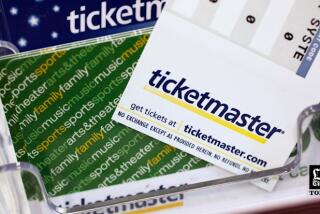San Fernando Valley businessmen linked to organizing ticket-scalping scheme
- Share via
David and Dana Pump, San Fernando Valley-based businessmen who are among the most influential figures in college basketball, helped to organize a lucrative scalping operation that is being investigated by federal authorities, according to a man who says he was a participant.
The allegations were made by David Freeman, a Lawrence, Kan., real estate developer, in an article published by Yahoo! Sports on Wednesday, hours before University of Kansas administrators announced that an examination by a Wichita, Kan., law firm found the “inappropriate” sale and use of thousands of men’s basketball and football tickets worth more than $1 million over the last five years.
In the website report, Freeman, who is facing an 18-month jail term for bank fraud in an unrelated bribery case, said he told federal investigators that the ticket scheme dated to 2002 and involved Kansas and other colleges that he didn’t identify.
Freeman said the operation started with the Pumps, who contacted former Jayhawks player Roger Morningstar about obtaining Kansas postseason basketball tickets. Morningstar obliged through a connection he made with the school’s assistant ticket manager at the time, Freeman said.
The Pumps, 43-year-old twins whose enterprises include prospect camps, traveling teams and a consultation business that works with colleges seeking to fill coaching vacancies, referred questions Wednesday to their attorney, David Cornwell.
Cornwell acknowledged that the Pumps “have been in the hospitality business for years,” but said, “there was no wrongdoing with Kansas or any other university on the planet.” He added, “I don’t know if this yarn has been spun to reduce someone’s prison time. I don’t know what [Freeman’s] motivation is.”
In addition to their consulting and player-development operations, the Pumps run the annual Collegiate Business Conference, which attracts some of the biggest names in college and professional sports. That event is scheduled at about the same time as a dinner and golf tournament that raise funds for cancer research and awareness through a foundation that carries the name of the Pumps’ late father, Harold Pump.
One coach who is close to the Pumps is UCLA’s Ben Howland, whose Bruins played in the 2006, 2007 and 2008 Final Fours.
Howland said Wednesday that he could recall giving the Pumps a small number of his Final Four tickets in 2008 because “they’re among my good friends. … I’ve known them for 25 years; really good people, and they have my full support.”
A UCLA athletic department spokesman confirmed that the Pumps attend “various games from time to time,” receiving two to four tickets. “They’re longtime friends of Coach and work with Adidas, so they’re treated how we’d treat any other sponsor,” said Marc Dellins, associate athletic director for sports information. “Everything we’ve done for them is above board.” He added that UCLA had no plans to examine its ticket distribution internally.
The probe at Kansas found that five former athletic department employees and a consultant sold or took for their personal use at least 17,609 men’s basketball tickets and 2,181 football tickets, plus valuable passes for parking and other uses.
The report has been turned over to federal investigators already exploring whether the operation involved theft, money laundering, tax evasion or other crimes. Authorities connected with Kansas’ internal investigation said the scheme might have started even before 2005 — the year the university said it began keeping accurate records. None of the employees found to be personally involved still work for the school.
In a 2005 interview with The Times, Dana Pump said the brothers were moving “away from the Final Four ticket business” but declined to explain how they took control of such tickets or who their clients were.
Cornwell on Wednesday would not say how the Pumps’ current ticket operation works.
“Someone has decided to talk about the business, but their allegations of wrongdoing are false,” Cornwell said. “We don’t need to explain our business … or rebut how we do business.”
More to Read
Go beyond the scoreboard
Get the latest on L.A.'s teams in the daily Sports Report newsletter.
You may occasionally receive promotional content from the Los Angeles Times.











